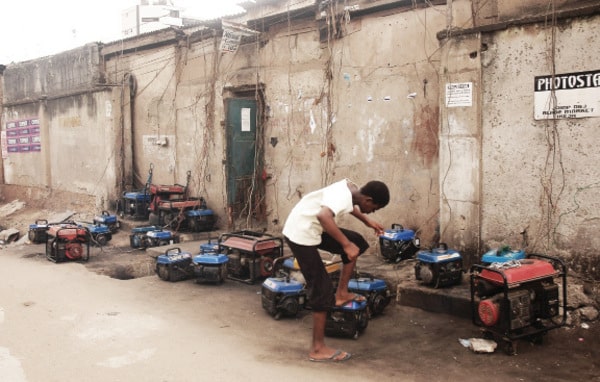At first glance, you would think that in the metropolitan cities of Nigeria (the likes of Lagos, Abuja, Kano et cetera) there is constant electricity. This cannot be further from the truth. This article will discuss why Nigerians lack a constant power supply.
The phrase “constant power supply” is a hyperbole. For those who don’t know literature, that means an intentional, obvious exaggeration. If you’re the type who has daily access to electricity, then congratulations, because your life is so much better than millions of Nigerians who have forgotten what it feels like to see their fan rotate, whose bulbs are only there for decoration and nothing more.
But why is this the case? How many times has the government sworn to improve the quality of power supply for all Nigerians? From Obasanjo to Jonathan to Fashola to Buhari, we have experienced nothing but failed promises regarding the power sector.
It has come to the point where Nigerians have embraced the concept of suffering in silence. So bad that the power body’s previous outfits while under the government received new meanings for their acronyms; NEPA became Never Expect Power Always and PHCN was Please Hold Candle at Night.
As if this isn’t worrisome enough, the lack of power supply is made far worse by the ongoing fuel scarcity. So those who even have standby generators in their homes aren’t exempted from this blight because even if they have alternate means of generating power, there is no fuel to buy.
No light, no fuel. Behold, everyone, your Nigeria.

Read: Current Price of Petrol in Nigeria
NLC’s Take On Power Supply
The Nigeria Labour Congress (NLC) described Nigeria’s power sector as a failure (like that’s news). They claim that both the Federal Government and operators have failed to meet the expectations of electricity consumers nationwide.
The Federal Government opposed this claim, though, doggedly arguing the sector is now healthy despite the challenges confronting the industry.
The Deputy President of NLC, who doubles as the General Secretary of the National Union of Electricity Employees, Joe Ajaero, said the quantum of electricity produced in the sector failed to increase since its privatization in November 2013.
According to him, the stagnancy in power generation continues despite the persistent rise in the demand for electricity by consumers. When they asked Ajaero to speak in 2022 on the lack of power supply, he said these words:
“If you’re looking at the power sector, since you asked me to use a word to qualify it, the power sector is a failing sector. It is a failing sector, and this means that it is going down, down, down. This is because the megawatts produced in that sector have remained constant, while the demand for them is increasing by the day.
If Nigeria had any conscious master plan, it would have ensured that power production grows to meet up with demand. For instance, if the demand for power is growing at 10 percent, we should be able to track it, by maybe increasing our generation capacity by 10 percent through the construction of a power plant that could give us, say 500MW, to check the rise in demand.”
Read: Angry citizens in Benin protest petrol scarcity, causes lockdown
Reasons Why Nigerians Lack Power Supply
75% of Nigerians still live without having access to a regular supply of electricity, despite the massive investments in the energy sector since the sector was privatized. According to recent statistics, about 45% of the Nigerian population is connected to electricity while only 25% enjoys a regular supply of electricity.
The few that enjoy a regular supply of electricity are in the urban areas of the country while those in the rural areas have less access to the power grid. As a result, there is economic redundancy in rural areas since electricity is essential for economic development.
Lots of factors are responsible for this undesirable situation. Let’s discuss them now.
Corruption
The endemic corruption in the nation is one of the chief factors responsible for the pitiable state of access to power. Funds meant for the development of the energy sector are either not fully utilized or diverted into other areas.
Poor Maintenance
Nigeria’s poor maintenance culture also inhibits power supply. Inadequate maintenance of energy assets reduces their efficiency, thereby leading to poor power supply.
Government Policies
Inconsistent government policies are also responsible for the poor power supply. Most of the government’s policies are not entirely geared toward developing the power sector, and conflicting policies will do the power sector no good.
Read: 2022 in Review: The Year of Shege
Vandalism
The vandalism of gas pipelines is a major problem looking the energy sector in the face.

The country has experienced many cases of vandalism. As a result, it is impossible to distribute gas to electricity-generating companies.
Inadequate Funding
Lack of adequate funding in the power sector also hinders the regular supply of electricity. This problem has both the government as well as consumers behind it.
A large portion of Nigerians dont’ pay their electricity bills. The government needs these bills to fund the sector, and when they don’t get them, it can cause a lack of widespread metering.
Read: How to Recharge Prepaid Meter Online
Aging Power Plants
Due to the aging power plants used in power generation, they lose efficiency. As a result, the output capacity of the plants reduces thereby reducing the power supply.
Sub-optimal Utilization of Fuels
These contribute to the reduction in the share of the nation’s generating capacity that can be actually used for power generation. This reduction, together with the less-than-optimal operation of power plants, causes a reduction in the capacity of thermal power plants.
Read: Price of Inverters in Nigeria
A Word From Battabox On Power Supply
The lack of electricity remains one of the biggest setbacks in national development. And the government must do better to improve the energy sector of the country. Now you know why Nigerians still lack power supply, but what can you do about it? Well, I can give you two ideas.
To start with, perhaps make a plea to the government and those concerned to see to the timely resurrection of this dying sector. An effective widespread metering and proper use of funds meant for the power sector should be ensured. These will go a long way in boosting start-ups and the economy at large.
OR
You can vote wisely during the coming elections.
If you have any questions, let us know below. You can also check out this video on our Youtube page on NEPA and PHCN:





